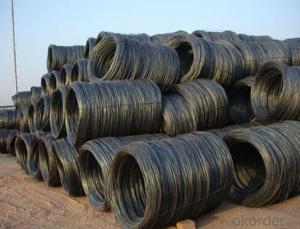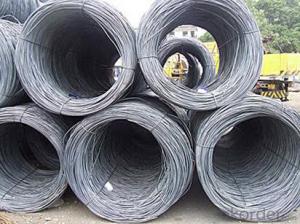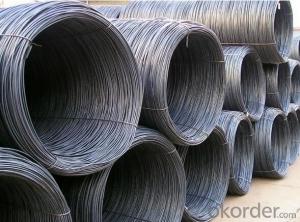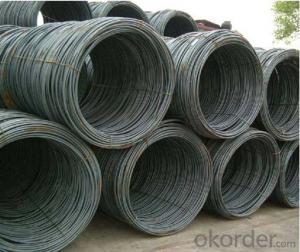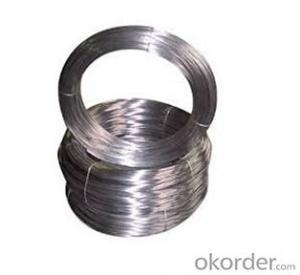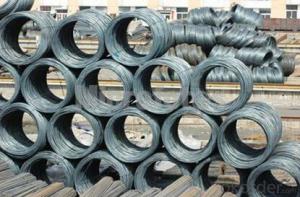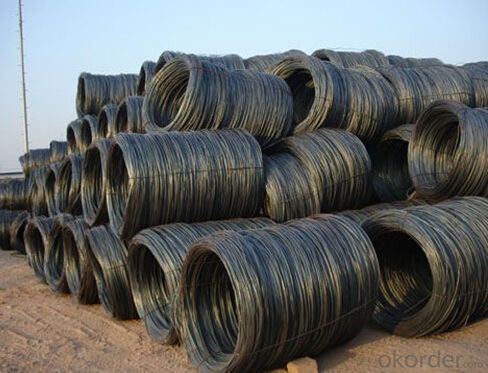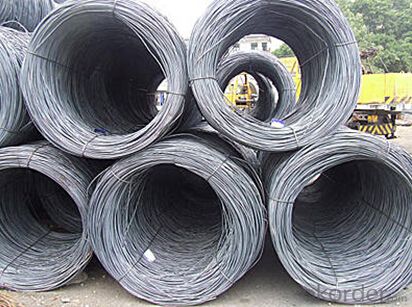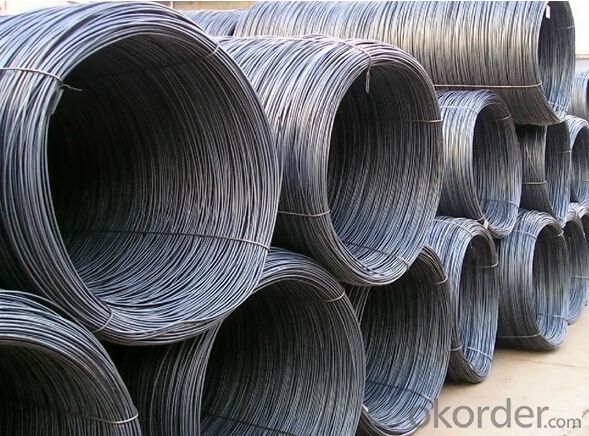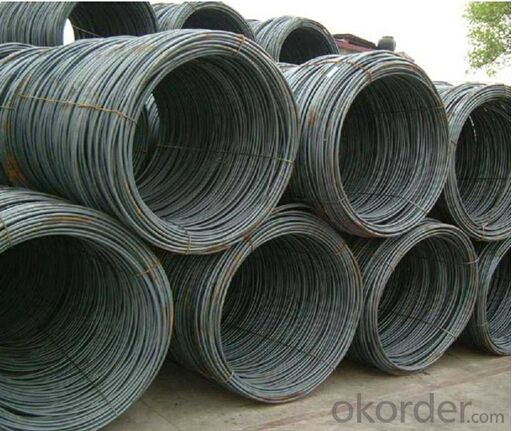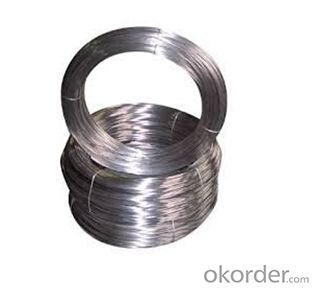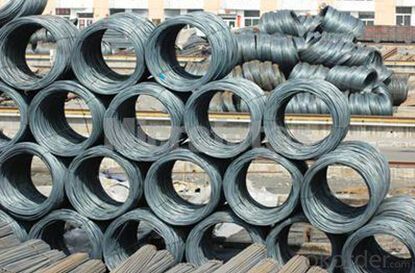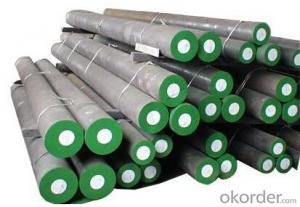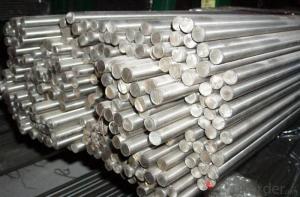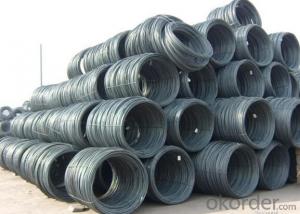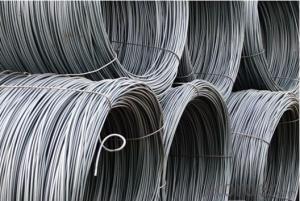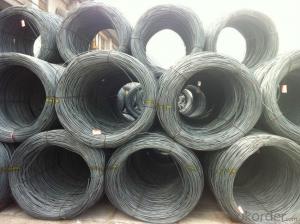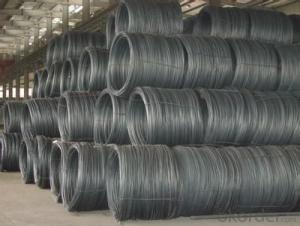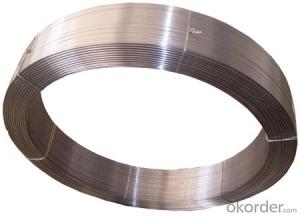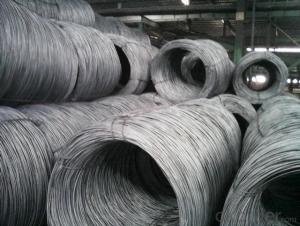m.s Wire Rod in Coils 5.5mm/6.5mm/8mm/10mm/12mm/16mm
- Loading Port:
- Tianjin
- Payment Terms:
- TT OR LC
- Min Order Qty:
- 10 m.t.
- Supply Capability:
- 10000 m.t./month
OKorder Service Pledge
OKorder Financial Service
You Might Also Like
Specification
m.s Wire Rod in Coils 5.5mm/6.5mm/8mm/10mm/12mm/16mm
Details of the m.s Wire Rod in Coils 5.5mm/6.5mm/8mm/10mm/12mm/16mm
| Steel Grade | Q195-Q235,Q235,SAE 1008-1018 Hot Rolled Steel Wire Rod |
| Diameter | 5.5, 6.5, 7,8, 9,10, 12,14mm.etc. |
| Coil weight | 2m.t. |
| Application | drawing, construction materials, machinery parts,construction for Houses, Bridges, Roads,Packing |
| Deliver Time | 25-30 days after receipt of L/C or deposit by T/T |
| Packing | In coils, loading in container or by bulk vessel |
| Payment terms | 1).100% irrevocable L/C at sight. |
| 2).30% T/T prepaid and the balance against the copy of B/L. | |
| 3).30% T/T prepaid and the balance against L/C |
| Chemical Composition(%) | ||||||
| C | Mn | Si | S | P | Cr | |
| SAE1006B | 0.03~O.07 | ≤0.32 | ≤0.30 | ≤0.045 | ≤0.040 | 0.3-0.35 |
| Mechanical properties | ||||||
| Yield strength(N/mm2) | Tensile strength(N/mm2) | Elongation(%) | ||||
| 250-280 | 350-380 | ≥32 | ||||
| Grade | Chemical Composition(%) | |||||
| C | Mn | Si | S | P | Cr | |
| SAE1008B | 0.10max | 0.3~O.50 | 0.15max | 0.050max | 0.040 max | 0.3-0.35 |
| Mechanical properties | ||||||
| Yield strength(N/mm2) | Tensile strength(N/mm2) | Elongation(%) | ||||
| ≥195 | 315-430 | ≥30 | ||||
Supplier of the m.s Wire Rod in Coils 5.5mm/6.5mm/8mm/10mm/12mm/16mm
CNBM International Corporation is the most import and export platform of CNBM group(China National Building Material Group Corporation) ,which is a state-owned enterprise, ranked in 270th of Fortune Global 500 in 2015.
With its advantages, CNBM International are mainly concentrate on Cement, Glass, Iron and Steel, Ceramics industries and devotes herself for supplying high quality series of refractories as well as technical consultancies and logistics solution.
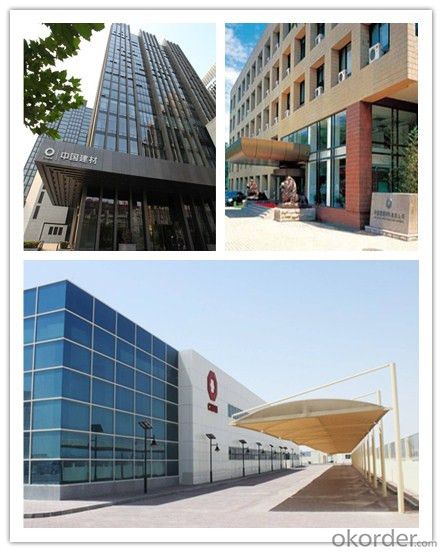
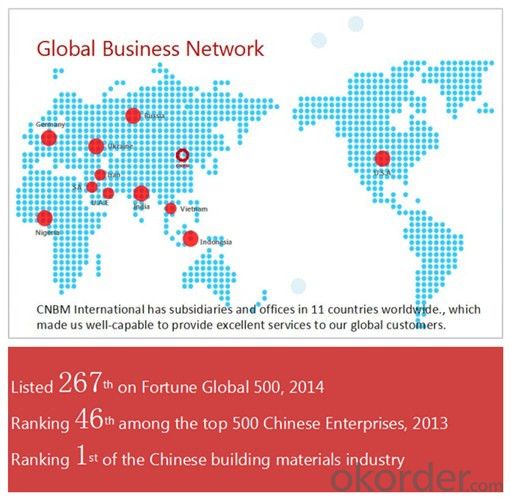
Delivery of the m.s Wire Rod in Coils 5.5mm/6.5mm/8mm/10mm/12mm/16mm
Packaging Detail | Sea worthy packing /as per customer's packing instruction |
Delivery Detail | 15 ~ 40 days after receiving the deposit |
Products Show
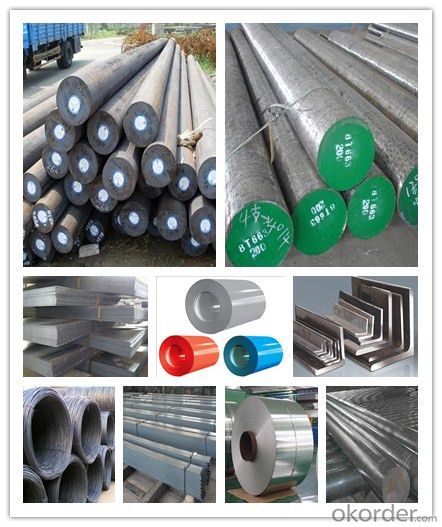
FAQ:
Are you a trading company or manufacturer? | Manufacturer |
What’s the MOQ? | 3 metric ton |
What’s your delivery time? | 15-35 days after downpayment received |
Do you Accept OEM service? | Yes |
what’s your delivery terms? | FOB/CFR/CIF |
What's the Payment Terms? | 30% as deposit,70% before shipment by T/T |
Western Union acceptable for small amount. | |
L/C acceptable for large amount. | |
Scrow ,Paybal,Alipay are also ok | |
Why choose us? | Chose happens because of quality, then price, We can give you both. Additionally, we can also offer professional products inquiry, products knowledge train (for agents), smooth goods delivery, excellent customer solution proposals. |
What's your available port of Shipment? | Main Port, China |
What’s your featured services? | Our service formula: good quality+ good price+ good service=customer's trust
|
Where are your Market? | Covering more than 160 countries in the world |
- Q: What are the different joining processes for special steel?
- There are several different joining processes for special steel, including welding, brazing, and soldering. Welding involves melting the base metals and adding a filler material to create a strong bond. Brazing involves heating the base metals and using a filler material with a lower melting point to join them together. Soldering is a similar process to brazing, but it uses a filler material called solder with an even lower melting point. These joining processes are used to create durable and reliable connections in special steel applications.
- Q: What are the common grades of special steel?
- The specific application and desired properties determine the varying common grades of special steel. Some frequently utilized grades are: 1. Stainless steel, an alloy resistant to corrosion containing a minimum of 10.5% chromium. Grades like 304, 316, and 410 possess exceptional corrosion resistance, high strength, and good formability, making them prevalent in various industries. 2. Tool steel, specifically designed for toolmaking, renowned for its high hardness, wear resistance, and toughness. Common grades such as D2, A2, O1, and S7 possess specific properties suitable for diverse applications. 3. High-speed steel (HSS), a type of tool steel retaining its hardness and cutting ability even at high temperatures. It frequently finds use in cutting tools like drills, end mills, and taps. M2, M35, and M42 are a few well-known HSS grades. 4. Alloy steel, made by incorporating different alloying elements to enhance specific properties. Grades like 4140, 4340, and 8620, known for their high strength, toughness, and wear resistance, are commonly utilized in industries such as automotive, aerospace, and machinery. 5. Spring steel, renowned for its ability to restore its original shape after bending or twisting. Grades like 1095 and 5160 are commonly employed in the manufacturing of springs, suspension components, and hand tools. These examples merely scratch the surface of the numerous available grades of special steel, each possessing unique properties and applications. It is vital to select the appropriate grade based on the specific requirements of the intended usage.
- Q: Can special steel be used for automotive engine components?
- Yes, special steel can be used for automotive engine components. Special steel, such as high-strength alloys or stainless steel, can offer superior mechanical properties, corrosion resistance, and heat resistance, making it suitable for demanding engine applications.
- Q: What are the requirements for special steel used in battery technology?
- To ensure optimal performance and safety, special steel utilized in battery technology must fulfill several requirements. First and foremost, it is imperative that the steel exhibits high corrosion resistance. This is crucial due to the presence of corrosive electrolytes within batteries that can gradually deteriorate the steel. Special steel must possess exceptional resistance to corrosion in order to prevent any chemical reactions that may compromise the battery's integrity and lifespan. Additionally, the steel must possess good mechanical strength to withstand the internal pressures and external forces that batteries encounter during operation and handling. It should be capable of resisting deformation and maintaining its structural integrity, even under high-stress conditions. Furthermore, it is desirable for the special steel to have high thermal conductivity. This is essential for efficient heat dissipation, as overheating can diminish battery performance and potentially lead to safety hazards. Steel with excellent thermal conductivity facilitates effective heat transfer, ensuring that the battery can function within safe temperature limits. Moreover, the steel should exhibit low electrical resistivity to minimize energy losses resulting from electrical resistance. This guarantees efficient energy transfer within the battery and reduces power dissipation, ultimately enhancing overall battery efficiency. In addition, compatibility with other battery materials, such as electrodes, electrolytes, and separators, is crucial. Ensuring compatibility prevents any chemical reactions or detrimental interactions that may jeopardize the battery's performance or lifespan. Finally, in line with the growing emphasis on environmental sustainability, it is increasingly important for special steel used in batteries to be produced using environmentally friendly methods. This entails minimizing the carbon footprint and reducing the consumption of scarce resources. To summarize, special steel utilized in battery technology must possess high corrosion resistance, mechanical strength, thermal conductivity, low electrical resistivity, compatibility with other battery materials, and environmental sustainability. These attributes are necessary to ensure optimal performance and safety in batteries.
- Q: What are the different cryogenic grades of special steel?
- There are several cryogenic grades of special steel, including but not limited to, austenitic stainless steel (such as 304L and 316L), ferritic stainless steel (such as 410 and 430), and martensitic stainless steel (such as 440C). These grades are specifically designed to maintain their mechanical properties and resist brittleness at extremely low temperatures.
- Q: How does special steel contribute to reducing maintenance costs?
- Special steel contributes to reducing maintenance costs by providing increased durability and resistance to wear and corrosion. Its superior strength and hardness properties make it less susceptible to damage, thereby reducing the frequency of repairs and replacements. Additionally, special steel's ability to withstand extreme temperatures and harsh environmental conditions extends the lifespan of components, reducing the need for frequent maintenance and associated costs.
- Q: Is special steel suitable for structural applications?
- Yes, special steel is well-suited for structural applications. This type of steel is engineered to possess specific properties and characteristics that meet the demands of various applications. Industries such as construction, automotive, aerospace, and oil and gas often rely on special steel. The outstanding strength, durability, and resistance to corrosion of special steel make it an ideal material for structural applications. It can withstand heavy loads, high temperatures, and extreme weather conditions, ensuring the safety and longevity of structures. Furthermore, special steel offers excellent weldability, machinability, and formability, allowing for flexibility in design and construction. It can be easily shaped, fabricated, and assembled into various structural components, making it suitable for complex and unique projects. Moreover, special steel comes in a wide range of grades and types, each tailored to meet specific structural requirements. These include carbon steel, alloy steel, stainless steel, and tool steel, among others. This versatility enables engineers and designers to select the most suitable type of special steel for their specific application, ensuring optimal performance and cost-effectiveness. In conclusion, special steel is highly suitable for structural applications due to its exceptional strength, durability, resistance to corrosion, and design flexibility. The wide range of grades and types available allows engineers and designers to choose the most appropriate material for their specific project requirements.
- Q: How does the demand for special steel vary across different regions?
- The demand for special steel varies across different regions due to several factors such as industrial development, infrastructure projects, and manufacturing activities. Regions with robust manufacturing sectors and infrastructure development tend to have higher demand for special steel as it is used in various applications like automotive, construction, and machinery. Additionally, regions with a higher focus on technological advancements and innovation may also have a greater demand for special steel due to its unique properties and capabilities. However, regions with limited industrial activities or dependence on specific sectors may exhibit lower demand for special steel. Overall, the demand for special steel is influenced by the specific economic and industrial characteristics of each region.
- Q: How does special steel contribute to reducing product defects?
- Special steel contributes to reducing product defects by offering enhanced properties such as increased strength, durability, and corrosion resistance. These properties ensure that the steel components used in various products, especially in critical applications, are less prone to wear, breakage, or malfunction. By using special steel, manufacturers can create more reliable and high-quality products, which ultimately leads to a reduction in defects and improves overall product performance.
- Q: How is special steel used in the manufacturing of industrial machinery?
- Special steel is used in the manufacturing of industrial machinery due to its exceptional strength, durability, and resistance to high temperatures and corrosion. It is commonly employed to create components such as gears, shafts, bearings, and tools, ensuring optimal performance and longevity of the machinery in demanding industrial environments.
Send your message to us
m.s Wire Rod in Coils 5.5mm/6.5mm/8mm/10mm/12mm/16mm
- Loading Port:
- Tianjin
- Payment Terms:
- TT OR LC
- Min Order Qty:
- 10 m.t.
- Supply Capability:
- 10000 m.t./month
OKorder Service Pledge
OKorder Financial Service
Similar products
Hot products
Hot Searches
Related keywords
